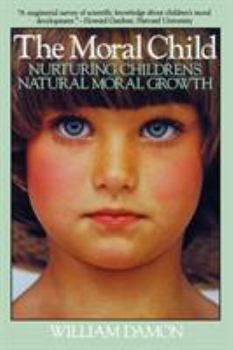Moral Child: Nurturing Children's Natural Moral Growth
Select Format
Select Condition 
Book Overview
Drawing on the best professional research and thinking, Professor William Damon charts pragmatic, workable approaches to foster basic virtues such as honesty, responsibility, kindness, and fairness--methods that can make an invaluable difference throughout children's lives.
Format:Paperback
Language:English
ISBN:0029069335
ISBN13:9780029069332
Release Date:April 1990
Publisher:Free Press
Length:174 Pages
Weight:0.65 lbs.
Dimensions:0.6" x 6.1" x 9.1"
Customer Reviews
3 ratings
MORALITY COMES FROM LIFE EXPERIENCE
Published by Thriftbooks.com User , 17 years ago
I wish I had read this book when my child was an infant, as I would have understood how morality in children really develops, and I could have assisted more in the process. William Damon really is an expert in this area, and his book is an excellent outline of how children develop a moral viewpoint from their own life experiences in sharing, developing empathy and reciprocity, and understanding social expectations. I plan on giving this book to some friends with preschool children, and I hope they will like it as much as I do. This is the best evidence based/scientific based book on this subject.
A Child's mind is ready for moral development
Published by Thriftbooks.com User , 19 years ago
Through immersion into children's real experiences, the author explains values like empathy and equality, which are found naturally in children, and progress into the formation of more sofisticated value hierarchies. Excellent read.
One of Damon's best books for parents, educators...
Published by Thriftbooks.com User , 20 years ago
William Damon has written a number of excellent scientific articles and books on social and self-development of children. In this book, designed for a lay audience of parents and teachers, Damon outlines the moral development of children, all of which takes place in the social crucible of family, childhood and adolescent friends, and school. He is a long way from being a naive moralist, however. Instead, Damon focuses on the factors that encourage moral development (what he calls "responsive engagement" with children) and those that discourage it (authoritarianism, permissive parenting, disconnected parenting, self-centered, etc.). His reasoning is quite clear. I liked best his summary section (p. 117-119) on how moral development occurs in childhood, and I think it is the best summary for lay persons that I have ever encountered. Another strength of the book is that Damon clearly contrasts competing theories well (for example, theories of "best parenting practices"). His summary of how to foster children's emotional and moral growth (Chapter 7) is quite good.Damon's knowledge of the psychological/social literature is very broad. This book is well-referenced. Nevertheless, academic readers may be discontended, because this book is aimed at parents, teachers, and other lay adults. Like many readers, the academic readers will look forward to reading Damon's other books.





